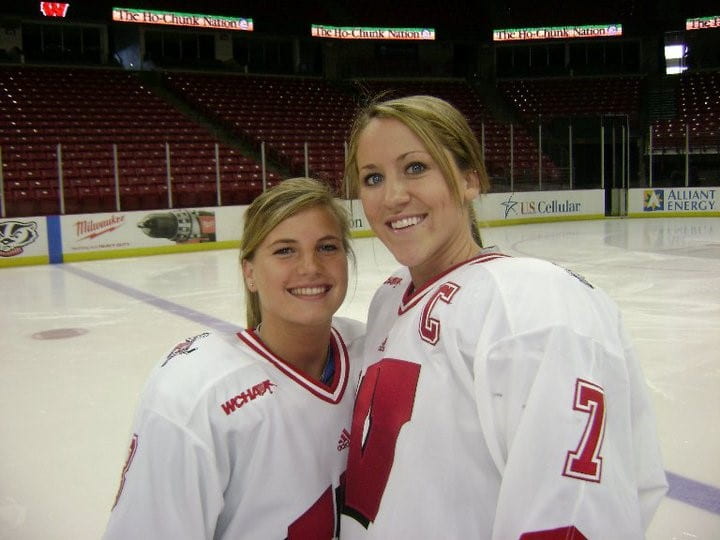
By Geena Fennell
For the Love of Hockey
I was fortunate enough to grow up playing hockey, a sport that I love. I loved it so much that I went on to play in college, where I won a NCAA National Championship in 2011. I was also fortunate enough to play with USA Hockey; I was in their active player pool after college and participated in various camps over my playing career. Because of my love for the sport, I decided I wanted to examine the business side of hockey – from both the players’ and administrations’ perspectives – when I came to the Kellstadt Graduate School of Business to pursue my MBA.
Women’s USA Hockey: Then and Now
The women’s USA hockey team took home the gold medal in 2018, the first team to do so since the inaugural Olympics for women’s hockey in 1998. Yet, this win received limited exposure in the media, a fact that unfortunately aligns with the way the team is treated in the sports field as a whole.
The USA Women’s hockey team is not given the same rights as their male counterparts, like financial support during the season and health care benefits to name a few, and a push for progress wasn’t made until a group of players partnered with Ballard Spahr Law Firm in 2015.
I played with the 2018 Captain of USA Hockey, Meghan Duggan, as well as Illinois native and two-time Olympian Kendall Coyne-Schofield. They are not only ambassadors for the game, but are advocates for equal rights for players in USA Hockey. Prior to the partnership with Ballard Spahr Law Firm, Duggan says, “Us as players were never able to stand together as a united front, so it is difficult to make change when not everyone is on the same page.”

But when negotiations to advance women players’ rights began with USA Hockey, they didn’t make any progress. So when the 2017 World Championships were being planned in Plymouth, Michigan, the team used the opportunity to ensure their demands were met by announcing a boycott. They missed the entire pre-camp until their needs were met by USA Hockey.
The move worked. Finally, the two parties negotiated a four-year contract, which included full funding during Olympic and non-Olympic years.
Before the contract, all active players for the national team were being paid the same amount with a monthly stipend in order to train and prepare in between Olympic Games. The contract ensured this included benefits through the US Olympic Committee, better injury and maternity coverage through USA Hockey, and the creation of a women’s advisory committee that meets monthly to discuss improvements consisting of players, representatives from the NHL and USA Hockey. What an accomplishment!
The Professional Women’s Hockey Players Association
Another major change in women’s hockey came in 2019 when the USA hockey players, along with a legal team from Ballard Spahr, and various advisors, created the Professional Women’s Hockey Players Association.
Historically, between Olympic years, national team players participated in the Canadian Women’s Hockey League without compensation. However, in 2015, the formation of the National Women’s Hockey League ensured the athletes were paid to play for the first time.
The league’s long-term structure, however, was not sustainable enough with sponsors or support from the NHL, so the Professional Women’s Hockey Players Association formed with their own board, advisor team and support from big names in women’s sports, such as Billie Jean King.
The best players always compete in different tournaments throughout Canada and the US. The goals of the association are to not only grow the game, but to have a professional league ultimately backed by the NHL. As Kendall Coyne Schofield stated during our conversation, “The infrastructure of a successful league has been in place by the NHL for 100 years, they just need to make room for women to be a part of that, and we can’t do it without the league and player’s support.”
Women in Hockey: Behind the Scenes
Women are playing a major role on the administrative side of hockey, too, and some of that is happening right in our backyard within the Chicago Blackhawks organization. Meghan Hunter is one woman making a difference by running senior vice president/general manager’s Stan Bowman’s schedule, and handling so much behind the scenes to make day-to-day operations run smoothly. Her colleague Annie Camins, meanwhile, has put in 11 years building the BlackHawks Fan Development program to grow the game in our community. You may not recognize these names, but these women are growing the game in Illinois.
Both Hunter and Camins believe that now, more than ever, is a great time for women in sports. Hunter explains: “There has been a push in our organization as well as the NHL to expand upon diversity and inclusion, and women are starting to take on more roles than ever before.”
After speaking to these amazing women, I learned how change is happening for women athletes in the fight for equal rights. More women are taking on administrative roles and opening doors for other women to enter. However, there is still a lot of work to be done. The more we can support our fellow women in hockey—by following the team on social media, going to their tournaments and events and getting young girls and women involved in the sport to grow the game—the more we can continue to build on their foundation and improve the opportunities for women hockey players and professionals in the future.
Geena Fennell graduated from the University of Wisconsin-Madison with a bachelor’s degree in history. She works full-time as an account manager for a large staffing and recruiting company and is completing her MBA at the Kellstadt Graduate School of Business, with concentrations in leadership and change management, as well as sports management.
Originally posted on Inside Kellstadt.